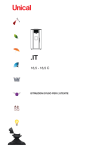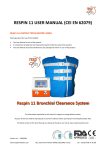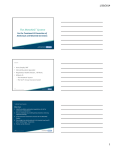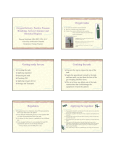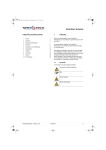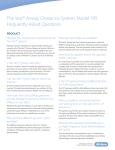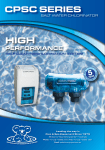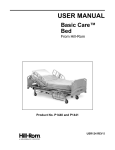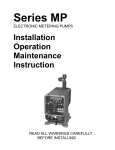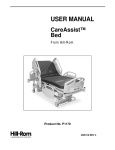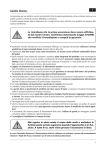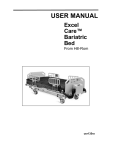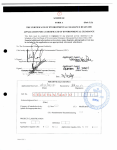Download USER MANUAL - The Vest® Airway Clearance System
Transcript
USER MANUAL The Vest Airway Clearance System, Model 104 ® From Hill-Rom USR150 REV 3 © 2007 by Hill-Rom Services, Inc. ALL RIGHTS RESERVED. Manufactured by: HILL-ROM 4349 CORPORATE ROAD CHARLESTON, SC 29405 UNITED STATES Authorised European Union Representative: HILL-ROM SAS B.P. 14 - Z.I. DU TALHOUET 56330 PLUVIGNER FRANCE TEL: +33 (0)2 97 50 92 12 No part of this text shall be reproduced or transmitted in any form or by any means, electronic or mechanical, including photocopying, recording, or by any information or retrieval system without written permission from Hill-Rom Services, Inc. (Hill-Rom). The information in this manual is confidential and may not be disclosed to third parties without the prior written consent of Hill-Rom. Third Edition First Printing 2004 Printed in the USA Hill-Rom® is a registered trademark of Hill-Rom Services, Inc. The UL logo is a registered trademark of Underwriters Laboratories, Inc. The Vest is a registered trademark of Hill-Rom Services, Inc. ® Underwriters Laboratories Inc.® is a registered trademark of Underwriters Laboratories Inc. Velcro® is a registered trademark of Velcro Industries, BV (a Dutch Corporation). The information contained in this manual is subject to change without notice. Hill-Rom makes no commitment to update or keep current, the information contained in this manual. Hill-Rom reserves the right to make changes without notice in design, specifications, and models. The only warranty Hill-Rom makes is the express written warranty extended on the sale or rental of its products. ® The Ves t Airway Clearance System, Model 104 User Manual (USR150 REV 3) i To order additional copies of this manual (USR150), refer to the back cover for contact information. For countries not listed on the back cover, contact your distributor. NOTE: The back cover is a comprehensive list of Technical Support contact information for Hill-Rom. The product discussed in this manual may not be available in all of the countries listed. Revision 1 2 3 ii Pages Affected Date November 2004 September 2005 September 2007 All All ® The Ves t Airway Clearance System, Model 104 User Manual (USR150 REV 3) Table of Contents Document Symbols . . . . . . . . . . . . . . . . . . . . . . . . . . . . . . . . . . . . 1 Safety Tips . . . . . . . . . . . . . . . . . . . . . . . . . . . . . . . . . . . . . . . . . . . 2 Contraindications . . . . . . . . . . . . . . . . . . . . . . . . . . . . . . . . . . . . . . 5 Relative Contraindications . . . . . . . . . . . . . . . . . . . . . . . . . . . 5 Cleaning . . . . . . . . . . . . . . . . . . . . . . . . . . . . . . . . . . . . . . . . . . . . . 7 General Cleaning . . . . . . . . . . . . . . . . . . . . . . . . . . . . . . . . . . 8 Home Care Environment . . . . . . . . . . . . . . . . . . . . . . . . . 8 Acute Care Environment . . . . . . . . . . . . . . . . . . . . . . . . . 8 Steam Cleaning . . . . . . . . . . . . . . . . . . . . . . . . . . . . . . . . . . . . 9 Cleaning Hard to Clean Spots . . . . . . . . . . . . . . . . . . . . . . . . 9 Disinfecting . . . . . . . . . . . . . . . . . . . . . . . . . . . . . . . . . . . . . . 9 Intended Use . . . . . . . . . . . . . . . . . . . . . . . . . . . . . . . . . . . . . . . . . 9 Introduction . . . . . . . . . . . . . . . . . . . . . . . . . . . . . . . . . . . . . . . . . 11 Features . . . . . . . . . . . . . . . . . . . . . . . . . . . . . . . . . . . . . . . . . . . . 12 Air Pulse Generator . . . . . . . . . . . . . . . . . . . . . . . . . . . . . . . 12 Air Outlets . . . . . . . . . . . . . . . . . . . . . . . . . . . . . . . . . . . 12 Display and Controls . . . . . . . . . . . . . . . . . . . . . . . . . . . 12 Remote Control and Air Hoses . . . . . . . . . . . . . . . . . . . . . . 13 Power Cord . . . . . . . . . . . . . . . . . . . . . . . . . . . . . . . . . . . . . . 13 Inflatable Vests . . . . . . . . . . . . . . . . . . . . . . . . . . . . . . . . . . . 14 Product Symbols . . . . . . . . . . . . . . . . . . . . . . . . . . . . . . . . . . . . . 15 Specifications . . . . . . . . . . . . . . . . . . . . . . . . . . . . . . . . . . . . . . . . 18 Classification and Standards . . . . . . . . . . . . . . . . . . . . . . . . 19 Electromagnetic Compatibility . . . . . . . . . . . . . . . . . . . . . . . 20 Instructions for Use . . . . . . . . . . . . . . . . . . . . . . . . . . . . . . . . . . . 24 Protocol for Use and Special Instructions for the Home Care Patient . . . . . . . . . . . . . . . . . . . . . . . . . . . . . . . . 24 Set Up the Unit . . . . . . . . . . . . . . . . . . . . . . . . . . . . . . . . . . . 25 Put on the Inflatable Vest . . . . . . . . . . . . . . . . . . . . . . . . . . . 29 Reusable Chest Vest (Home Care Environment) . . . . . 29 ® The Ves t Airway Clearance System, Model 104 User Manual (USR150 REV 3) iii Reusable Full Vest (Home Care Environment) . . . . . . . . . . . . . . . . . . . . . . 31 Disposable Wrap SPU Vest (Acute Care Environment) . . . . . . . . . . . . . . . . . . . . . . 32 Disposable Full SPU Vest (Acute Care Environment) . . . . . . . . . . . . . . . . . . . . . . 33 Use The Vest® Airway Clearance System, Model 104 . . . . . . . . . . . . . . . . . . . . . . . . . . . . . . . . . . . . . . . 34 Maintenance . . . . . . . . . . . . . . . . . . . . . . . . . . . . . . . . . . . . . . . . . 38 Service Calls . . . . . . . . . . . . . . . . . . . . . . . . . . . . . . . . . . . . . . . . 39 Replacement Parts . . . . . . . . . . . . . . . . . . . . . . . . . . . . . . . . . . . . 40 Troubleshooting . . . . . . . . . . . . . . . . . . . . . . . . . . . . . . . . . . . . . . 42 Air Pulse Generator Does Not Power On . . . . . . . . . . . . . . . 42 Inflatable Vest No Longer Fits (Home Care Environment) . . . . . . . . . . . . . . . . . . . . . . . . . . 42 No Air Pulses into the Inflatable Vest . . . . . . . . . . . . . . . . . 42 Display Alternates between “Please Call for Service” and “Device Error X” Messages . . . . . . . . . . . . . . . . . . . . . . . . . 43 An Air Hose Comes Out of the Air Pulse Generator or Inflatable Vest during Operation . . . . . . . . . . . . . . . . . . . . . 43 Storage and Handling . . . . . . . . . . . . . . . . . . . . . . . . . . . . . . . . . . 44 Storage Bag (Home Care Environment) . . . . . . . . . . . . . . . . 44 Shipping the Unit . . . . . . . . . . . . . . . . . . . . . . . . . . . . . . . . . 44 Frequently Asked Questions . . . . . . . . . . . . . . . . . . . . . . . . . . . . 45 Display Messages . . . . . . . . . . . . . . . . . . . . . . . . . . . . . . . . . . . . 47 iv ® The Ves t Airway Clearance System, Model 104 User Manual (USR150 REV 3) Document Symbols This manual contains different typefaces and symbols to make the content easier to read and understand: • Standard text—used for regular data. • Boldface text—emphasises a word or phrase. • NOTE:—sets apart special data or important instruction clarification. • WARNING or CAUTION – A WARNING identifies situations or actions that may have an effect on patient or user safety. To ignore a warning could cause patient or user injury. – A CAUTION identifies special procedures or precautions that persons must obey to help prevent equipment damage. • ELECTRICAL SHOCK HAZARD WARNING ® The Ves t Airway Clearance System, Model 104 User Manual (USR150 REV 3) 1 Safety Tips When you use electrical products, always obey safety precautions and these important safety tips: READ ALL INSTRUCTIONS BEFORE PRODUCT USE WARNING: To reduce the risk of electrocution, obey these instructions. Failure to do so could cause personal injury or equipment damage. • Unplug this system immediately after you use it. WARNING: Do not use the system near flammable anaesthetics. To do so could cause personal injury or equipment damage. • Do not use this system near flammable anaesthetics. WARNING: To reduce the risk of burns, electrocution, fire, or personal injury, obey these instructions. Failure to do so could cause personal injury or equipment damage. • Patients that may have difficulty clearing secretions from the upper airway (such as those with DMD or other advanced neuromuscular or neurological disorders) may require specialized therapy regiments involving manually or mechanically assisted coughing or other ® techniques in conjunction with The Vest Airway Clearance System, Model 104 therapy. Please consult your physician to determine if additional therapy is appropriate. 2 ® The Ves t Airway Clearance System, Model 104 User Manual (USR150 REV 3) • Use close supervision throughout the treatment when this system is used by or near children or patients with physical limitations or impaired cognitive abilities. • Use this system only for its intended use. Use only those attachments that are specified by the manufacturer. • If this system has a damaged Power Cord or plug, does not operate correctly, or has been dropped or damaged; do not operate it. For test and repair, call Hill-Rom Technical Support. For contact information, refer to the back cover. • Keep the unit and its Power Cord away from heated surfaces. • Never drop or insert inappropriate objects into any opening on the unit. • Plug this system into a known-good outlet only. • Read and obey all instructions for setup, use, and maintenance of the unit. Failure to do so could cause patient injury or equipment damage. • If the patient has a condition that prevents the use of the unit, do not use the system. Death or serious injury could occur. • Federal USA law restricts this device to sale by or on the order of a physician. Sale by or on the order of unauthorized persons may cause patient injury. • To help prevent cross-contamination, replace the single-patient use inflatable vest between patients. Failure to do so could cause patient injury or equipment damage. • Only authorized persons should service the unit. Service by unauthorized persons could cause personal injury or equipment damage. ® The Ves t Airway Clearance System, Model 104 User Manual (USR150 REV 3) 3 NOTE: If service is necessary, call Hill-Rom Technical Support. For contact information, refer to the back cover. For countries not listed on the back cover, contact your distributor. • The potential for electrical shock exists with electrical equipment. Failure to follow electrical use protocols may cause death or serious personal injury. • If the Air Pulse Generator is wet or damp, do not plug it into a power source, or use it. Patient injury, personal injury, or equipment damage could occur. • Use a known-good electrical outlet only. Do not use the Air Pulse Generator with an extension cord or multiple-use electrical outlet adapter. Death, serious injury, or equipment damage could occur. • Before you clean the system, unplug it from its power source. Failure to do so could cause personal injury or equipment damage. • Do not expose the system to excessive moisture or immerse it in water. Personal injury or equipment damage could occur. • Do not operate the Air Pulse Generator without the inflatable vest and Air Hoses attached. Equipment damage could occur. • If it is difficult to connect the Air Hose to the Air Pulse Generator or inflatable vest, do not use lubricant. Equipment damage could occur. • If it is difficult to connect the Remote Control to the Air Pulse Generator, do not use lubricant. Equipment damage could occur. • Do not use harsh cleansers, solvents, or detergents. Equipment damage could occur. • Frequent exposure to phenol-based germicidal detergent may discolor the Air Pulse Generator. • If you use bleach-based (NaOCI) disinfectants or quarternary ammonium-based disinfectant cleaners, make sure you wipe the unit dry. Failure to do so could cause the build-up of residue or equipment damage. • If shipping is necessary, the original packing material is designed to protect the unit during shipment. Keep the original packing material so it can be used if it is necessary to ship the system. KEEP THESE INSTRUCTIONS 4 ® The Ves t Airway Clearance System, Model 104 User Manual (USR150 REV 3) Contraindications WARNING: If the patient has a condition that prevents the use of The Vest Airway Clearance System, Model 104, do not use the system. Death or serious injury could occur. ® Do not use The Vest Airway Clearance System, Model 104 if the patient has one or more of these conditions: ® • Head and/or neck injury that has not been stabilised • Active hemorrhage with hemodynamic instability Relative Contraindications If the patient has one or more of the conditions below, before you use The Vest Airway Clearance System, carefully consider and assess the patient’s case, in accordance with the American Association for Respiratory Care (AARC) Guidelines for Postural Drainage: ® • Intracranial pressure (ICP) >20 mm Hg, or patients in whom increased intracranial pressure is to be avoided • Recent spinal surgery or acute spinal injury • Bronchopleural fistula • Pulmonary edema associated with congestive heart failure • Large pleural effusions or empyema • Pulmonary embolism • Rib fractures, with or without flail chest • Surgical wound or healing tissue or recent skin grafts or flaps on the thorax • Uncontrolled hypertension • Distended abdomen • Recent esophageal surgery • Active or recent gross hemoptysis • Uncontrolled airway at risk for aspiration such as Air Hose feeding or a recent meal • Subcutaneous emphysema ® The Ves t Airway Clearance System, Model 104 User Manual (USR150 REV 3) 5 • Recent epidural spinal infusion or spinal anesthesia • Burns, open wounds, and skin infections on the thorax • Transvenous or subcutaneous pacemaker • Hemodynamic instability • Suspected pulmonary tuberculosis • Lung contusion • Bronchospasm • Osteoporosis or osteomyelitis of the ribs • Coagulopathy • Complaint of chest wall pain 6 ® The Ves t Airway Clearance System, Model 104 User Manual (USR150 REV 3) Cleaning WARNING: Follow the product manufacturer’s instructions. Failure to do so could cause personal injury or equipment damage. SHOCK HAZARD: The potential for electrical shock exists with electrical equipment. Failure to follow electrical use protocols may cause death or serious personal injury. SHOCK HAZARD: Unplug the unit from its power source before you clean it. Failure to do so could cause personal injury or equipment damage. SHOCK HAZARD: Do not expose the unit to excessive moisture. Personal injury or equipment damage could occur. CAUTION: Do not use harsh cleansers, solvents, or detergents. Equipment damage could occur. ® The Ves t Airway Clearance System, Model 104 User Manual (USR150 REV 3) 7 The Vest Airway Clearance System, Model 104 has been tested for compatibility with these detergents: ® CAUTION: Frequent exposure to phenol-based germicidal detergent may discolor the Air Pulse Generator. • Phenol-based germicidal detergent • Alcohol-based disinfectants. CAUTION: If you use bleach-based (NaOCI) disinfectants or quarternary ammonium-based disinfectant cleaners, make sure you wipe the unit dry. Failure to do so could cause in the build-up of residue or equipment damage. • Bleach-based disinfectants • Quarternary ammonium-based disinfectant cleaner General Cleaning Home Care Environment We recommend that you clean the Air Pulse Generator and inflatable vest with a soft cotton cleaning pad that is slightly moist from detergent and warm water. Do not use excessive liquid or harsh cleansers. Do not put The Vest Airway Clearance System, Model 104 in water or let liquids enter the Air Pulse Generator. ® After you clean the system, wipe it dry. Acute Care Environment WARNING: To help prevent cross-contamination, replace the single-patient use inflatable vest and Air Hoses between patients. Failure to do so could cause patient injury or equipment damage. NOTE: In the Acute Care environment, the inflatable vests and Air Hoses are single-patient use, latex-free, disposable products for use on individual patients over multiple treatment sessions. Clean The Vest Airway Clearance System, Model 104 between patients, or when visibly soiled if used on the same patient. Replace the inflatable vest and Air Hoses between patients or when it is damaged. ® 8 ® The Ves t Airway Clearance System, Model 104 User Manual (USR150 REV 3) We recommend that you clean the Air Pulse Generator and Remote Control with a soft cotton cleaning pad that is slightly moist from detergent and warm water. Do not use excessive liquid or harsh cleansers. Do not immerse The Vest Airway Clearance System, Model 104 in water or allow liquids to enter the Air Pulse Generator. ® After you clean the system, wipe it dry. Steam Cleaning Do not use any steam cleaning device on the unit. Excessive moisture can damage mechanisms in this unit. Cleaning Hard to Clean Spots Air Pulse Generator—To remove difficult spots or stains, we recommend that you use standard household cleansers and a soft bristle brush. To loosen heavy, dried-on soil, you may first need to saturate the spot. Do not put any component of The Vest Airway Clearance System, Model 104 in water. ® Disinfecting When there is visible soil and between patient use, we recommend that you disinfect the unit with an intermediate level, tuberculocidal disinfectant. Use the disinfectant as specified in the disinfectant manufacturer's instructions. Intended Use WARNING: Read and obey all of the instructions for setup, use, and maintenance for The Vest Airway Clearance System, Model 104. Failure to do so could cause patient injury or equipment damage. ® This manual includes instructions for setup, use, and maintenance of The Vest Airway Clearance System, Model 104. Before you use the system, carefully read all of this manual, and make sure you obey the instructions for your safety and to get the best therapeutic benefit. Most importantly, obey all warnings, cautions, and notes in this manual. ® ® The Ves t Airway Clearance System, Model 104 User Manual (USR150 REV 3) 9 NOTE: This manual is not intended as a substitute for information you receive from your physician or other healthcare providers. Use The Vest Airway Clearance System, Model 104 as prescribed by your physician. ® 10 ® The Ves t Airway Clearance System, Model 104 User Manual (USR150 REV 3) Introduction The Vest Airway Clearance System, Model 104 was developed to help supply effective Airway Clearance Therapy. The system has an inflatable vest attached by Air Hoses to an Air Pulse Generator. The Air Pulse Generator rapidly inflates and deflates the inflatable vest to gently compress and release the chest wall which creates airflow within the lungs. This process, which mimics coughing, moves mucus toward the large airways where it can be cleared by coughing or suctioning. This type of Airway Clearance Therapy is referred to as High Frequency Chest Wall Oscillation (HFCWO). ® ® The Ves t Airway Clearance System, Model 104 User Manual (USR150 REV 3) 11 Features Air Pulse Generator When correctly connected, the Air Pulse Generator controls the inflatable vest and supplies pulsations to the chest wall. Air Outlets Air outlets Air Hoses connect at the two air outlets on the front of the Air Pulse Generator. Display and Controls Item A Control ON B and C Frequency Up and Down D and E Pressure Up and Down F and G Treatment Time Up and Down H OFF 12 Description Press to fill the inflatable vest and start or pause the Air Pulse Generator. Press to adjust the Frequency setting until the prescribed treatment session Frequency shows on the display. Press to adjust the Pressure setting until the prescribed treatment session Pressure shows on the display. Press to adjust the treatment Time until the prescribed treatment session Time shows on the display. Press to stop the Air Pulse Generator. ® The Ves t Airway Clearance System, Model 104 User Manual (USR150 REV 3) The display shows the current Frequency, Pressure, and treatment Time settings and system messages. NOTE: The display shows its messages in English. For a translation of the messages in your language, refer to “Display Messages” on page 47. Remote Control and Air Hoses The Remote Control can be used instead of the ON control to start or pause the Air Pulse Generator. The Air Hoses connect the inflatable vest to the Air Pulse Generator. Power Cord The Power Cord plugs into the Air Pulse Generator and a grounded outlet. NOTE: The Power Cord necessary for your country may be different than the one shown. ® The Ves t Airway Clearance System, Model 104 User Manual (USR150 REV 3) 13 Inflatable Vests For use in the home care environment, these reusable, inflatable vests are available in several standard sizes of these two types: • Chest Vest • Full Vest Reusable Chest Vest Reusable Full Vest For use in an acute care facility, these disposable, single-patient use, inflatable vests are available in several standard sizes of these two types: • Wrap SPU Vest • Full SPU Vest Disposable Wrap SPU Vest Disposable Full SPU Vest 14 ® The Ves t Airway Clearance System, Model 104 User Manual (USR150 REV 3) Product Symbols Symbol Definition Type B equipment with an F-type applied part, according to EN 60601-1. Dangerous voltage within the device may constitute a risk of electrical shock. ON OFF ON control—starts the Air Pulse Generator OFF control—stops the Air Pulse Generator Frequency setting Pressure setting treatment Time setting ® The Ves t Airway Clearance System, Model 104 User Manual (USR150 REV 3) 15 Symbol Definition Up arrow control—increases the Frequency, Pressure, or treatment Time setting Down arrow control—decreases the Frequency, Pressure, or treatment Time setting Remote Control port Attention: Consult accompanying documents. Class II equipment (double insulated), according to EN60601-1 IPX 0 Not protected against water ingress a Medical Equipment with respect to electric shock, fire, mechanical, and other specified hazards only in accordance with UL/EN/IEC 60601-1 and CAN/CSA C22.2 No. 601.1 a. The UL logo is a registered trademark of Underwriters Laboratories Inc. 16 ® The Ves t Airway Clearance System, Model 104 User Manual (USR150 REV 3) Symbol Definition Conforms to the European Medical Device Directive 93/42/EEC Identifies a replaceable fuse link in an electronic circuit Manufacturer or distributor complies with the Waste Electric and Electronic Equipment Directive 2002/96/EC ® The Ves t Airway Clearance System, Model 104 User Manual (USR150 REV 3) 17 Specifications Feature Dimension Air Pulse Generator weight Air Pulse Generator height Air Pulse Generator width Air Pulse Generator depth Inflatable vest material— Reusable Chest Vest Inflatable vest material— Reusable Full Vest Inflatable vest material— Disposable Wrap and Full SPU Vest Electrical requirements Fuse requirement 17 lb (8 kg) 9.5" (24.1 cm) 13" (33 cm) 9.5" (24.1 cm) Polyvinyl chloride (PVC)-coated polyester with polyurethane-coated nylon Polyurethane-coated nylon PVC-coated, thermally-bonded nylon 100 V AC to 230 V AC, 50 Hz to 60 Hz, 2.9 A at 100 V, 2.0 A at 230 V 2 each 4 A, 5 x 20 mm (Littelfuse part number F4AL250V) Environmental Conditions for Transport and Storage Condition Temperature Relative humidity Atmospheric pressure Range -40°F to 158°F (-40°C to 70°C) 95% non-condensing 500 hPa to 1060 hPa Environmental Conditions for Use Condition 18 Range Temperature 50°F to 93°F (10°C to 34°C) ambient temperature Relative humidity range 30% to 75% non-condensing Atmospheric pressure 700 hPa to 1060 hPa ® The Ves t Airway Clearance System, Model 104 User Manual (USR150 REV 3) Classification and Standards Technical and Quality Assurance Equipment Classification Degree of Protection Against Electric Shock Classification According to Directive 93/42/EEC Degree of Protection Against Ingress of Water UL/EN/IEC 60601-1 CAN/CSA C22.2 No. 601.1 ISO 13485 Class II BF with type F applied part IIa IPX 0 The Vest Airway Clearance System, Model 104 is a continuous operation device classified with Underwriters Laboratories Inc.® (UL) in the United States and licensed with Health Canada. ® 1 1. Underwriters Laboratories Inc.® is a registered trademark of Underwriters Laboratories Inc. ® The Ves t Airway Clearance System, Model 104 User Manual (USR150 REV 3) 19 Electromagnetic Compatibility Medical electrical equipment needs special precautions regarding electromagnetic compatibility and needs to be installed and put into service according to the information provided in these tables. Portable and mobile radio-frequency (RF) communications equipment can affect medical electrical equipment. Guidance and Manufacturer’s Declaration— Electromagnetic Emissions ® The Vest Airway Clearance System, Model 104 is intended for use in the electromagnetic environment specified below. The customer or user of the Model 104 should make sure it is used in such an environment. Emissions Test Compliance Electromagnetic Environment—Guidance RF emissions CISPR 11 Group 1 The Model 104 uses RF energy only for its internal function. Therefore, its RF emissions are very low and are not likely to cause any interference in nearby electronic equipment. RF emissions CISPR 11 Class B Harmonic emissions IEC 61000-3-2 Class A Voltage fluctuations/ flicker emissions IEC 61000-3-3 Complies The Model 104 is suitable for use in all establishments, including domestic establishments and those directly connected to the public low-voltage power supply network that supplies buildings used for domestic purposes. 20 ® The Ves t Airway Clearance System, Model 104 User Manual (USR150 REV 3) Guidance and Manufacturer’s Declaration— Electromagnetic Immunity ® The Vest Airway Clearance System, Model 104 is intended for use in the electromagnetic environment specified below. The customer or user of the Model 104 should make sure it is used in such an environment. Immunity Test IEC 60601 Test Level Compliance Level Electromagnetic Environment— Guidance Electrostatic discharge (ESD) IEC 61000-4-2 ± 6 kV contact ± 6 kV air ± 6 kV contact ± 6 kV air Floors should be wood, concrete, or ceramic tile. If floors are covered with synthetic material, the relative humidity should be at least 30%. Electrical fast transient/burst IEC 61000-4-4 ± 2 kV for power supply lines ± kV for input/output lines ± 2 kV for power supply lines ± kV for input/output lines Mains power quality should be that of a typical commercial or hospital environment. Surge IEC 61000-4-5 ± 1 kV differential mode ± 2 kV common mode ± 1 kV differential mode ± 2 kV common mode Mains power quality should be that of a typical commercial or hospital environment. Mains power quality should be that of a typical commercial or hospital environment. If it is necessary for the user to have continued operation of the Model 104 during power mains interruptions, it is recommended that the Model 104 be powered from an uninterruptible power supply or a battery. Voltage dips, short interruptions and voltage variations on power supply input lines IEC 61000-4-11 Power frequency (50/60 Hz) magnetic field IEC 61000-4-8 <5% UT <5% UT (>95% dip in UT) for 0,5 (>95% dip in UT) for 0,5 cycle 40% UT cycle 40% UT (60% dip in UT) for 5 (60% dip in UT) for 5 cycles 70% UT cycles 70% UT (30% dip in UT) for 25 (30% dip in UT) for 25 cycles <5% UT cycles <5% UT (>95% dip in UT) for 5 (>95% dip in UT) for 5 seconds seconds 3 A/m 3 A/m Power frequency magnetic fields should be at levels characteristic of a typical location in a typical commercial or hospital environment. NOTE: UT is the AC mains voltage prior to application of the test level. ® The Ves t Airway Clearance System, Model 104 User Manual (USR150 REV 3) 21 Guidance and Manufacturer’s Declaration— Electromagnetic Immunity ® The Vest Airway Clearance System, Model 104 is intended for use in the electromagnetic environment specified below. The customer or user of the Model 104 should make sure it is used in such an environment. Immunity Test IEC 60601 Compliance Electromagnetic Environment—Guidance Test Level Level Portable and mobile RF communications equipment should be used no closer to any part of the Model 104, including cables, than the recommended separation distance calculated from the equation applicable to the frequency of the transmitter. Recommended separation distance Conducted RF IEC 61000-4-6 3 Vrms 150 kHz to 80 MHz 3V Radiated RF IEC 61000-4-3 3 V/m 80 MHz to 2,5 GHz 3 V/m 3.5 d = ------3 3.5 d = ------3 7 d = --3 P P P 80 MHz to 800 MHz 800 MHz to 2,5 GHz where P is the maximum output power rating of the transmitter in watts (W) according to the transmitter manufacturer and d is the recommended separation distance in metres (m). Field strengths from fixed RF transmitters, as found by an electromagnetic site survey , should be less than the compliance level in each frequency range . Interference may occur in the vicinity of equipment marked with this symbol: a b NOTE: At 80 MHz and 800 MHz, the higher frequency range applies. NOTE: These guidelines may not apply in all situations. Electromagnetic propagation is affected by absorption and reflection from structures, objects, and people. a. Field strengths from fixed transmitters, such as base stations for radio (cellular/cordless) telephones and land mobile radios, amateur radio, AM and FM radio broadcast, and TV broadcast cannot be predicted theoretically with accuracy. To assess the electromagnetic environment due to fixed RF transmitters, the electromagnetic site used should be considered. If the measured field strength in the location in which the Model 104 is used is more than the applicable RF compliance level above, the Model 104 should be monitored to make sure it operates correctly. If it operates incorrectly, additional measures may be necessary, such as a change in the Model 104’s position or location. b. Over the frequency range 150 kHz to 80 MHz, field strengths should be less than 3 V/m. 22 ® The Ves t Airway Clearance System, Model 104 User Manual (USR150 REV 3) Recommended Separation Distances Between Portable and Mobile RF Communications Equipment and the Model 104 ® The Vest Airway Clearance System, Model 104 is intended for use in an electromagnetic environment in which radiated RF disturbances are controlled. The customer or user of the Model 104 can help prevent electromagnetic interference if they maintain the minimum distance between portable and mobile RF communications equipment (transmitters) and the Model 104. The recommended distances, in accordance, are shown below: Rated Maximum Output Power of the Transmitter Separation Distance According to the Frequency of the Transmitter 150 kHz to 80 MHz 3.5 d = ------V1 P 80 MHz to 800 MHz 800 MHz to 2,5 GHz 3.5 d = ------E1 P 7 d = -----E1 0,01 W 0,12 m 0,12 m 0,1 W 0,37 m 0,37 m 0,74 m 1W 1,2 m 1,2 m 2,3 m 10 W 3,7 m 3,7 m 7,4 m 100 W 12 m 12 m 23 m P 0,23 m For transmitters rated at a maximum output power not listed above, the recommended separation distance d in metres (m) can be estimated with the use of the equation applicable to the frequency of the transmitter, where P is the maximum output power rating of the transmitter in watts (W) according to the transmitter manufacturer. NOTE: At 80 MHz to 800 MHz, the separation distance for the higher frequency range applies. NOTE: These guidelines may not apply in all situations. Electromagnetic propagation is affected by absorption and reflection from structures, objects, and people. ® The Ves t Airway Clearance System, Model 104 User Manual (USR150 REV 3) 23 Instructions for Use Protocol for Use and Special Instructions for the Home Care Patient Your physician has prescribed The Vest Airway Clearance System, Model 104 to be used __________ times per day. ® Additional Instructions: _________________________________________________________ _________________________________________________________ _________________________________________________________ _________________________________________________________ _________________________________________________________ _________________________________________________________ _________________________________________________________ _________________________________________________________ _________________________________________________________ _________________________________________________________ _________________________________________________________ NOTES: _________________________________________________________ _________________________________________________________ _________________________________________________________ _________________________________________________________ _________________________________________________________ _________________________________________________________ _________________________________________________________ _________________________________________________________ If you have any questions or concerns, call Hill-Rom Technical Support. For contact information, refer to the back cover. 24 ® The Ves t Airway Clearance System, Model 104 User Manual (USR150 REV 3) Set Up the Unit NOTE: If your physician has prescribed aerosol therapy to be used during your treatment session, set up the applicable equipment. SHOCK HAZARD: If the Air Pulse Generator is wet or damp, do not plug it into a power source or use it. Patient injury, personal injury, or equipment damage could occur. 1. Make sure the Air Pulse Generator is not wet or damp. 2. Plug the Power Cord into the back of the Air Pulse Generator. SHOCK HAZARD: Use a known-good electrical outlet only. Do not use the Air Pulse Generator with an extension cord or multiple-use electrical outlet adapter. Death, serious injury, or equipment damage could occur. 3. Plug the Power Cord into a known-good electrical outlet. Once the unit is plugged in, the display shows this data: a. Software revision b. Total number of hours the device has been used by the current patient NOTE: The Power Cord necessary for your country may be different than the one shown. ® The Ves t Airway Clearance System, Model 104 User Manual (USR150 REV 3) 25 NOTE: To temporarily turn on the backlight on the display, press any one of the six Up or Down arrow controls. CAUTION: Do not operate the Air Pulse Generator without the inflatable vest and Air Hoses attached. Equipment damage could occur. 4. Connect the Air Hoses to the air outlets on the front of the Air Pulse Generator. CAUTION: If it is difficult to connect the Air Hose to the Air Pulse Generator or inflatable vest, do not use lubricant. Equipment damage could occur. 26 5. Slightly twist each Air Hose into its air outlet to help keep it in position. If it is difficult to connect the Air Hose to the Air Pulse Generator, do not use lubricant. 6. Put on an inflatable vest (see “Put on the Inflatable Vest” on page 29). ® The Ves t Airway Clearance System, Model 104 User Manual (USR150 REV 3) 7. Connect the Air Hoses to the Air Hose ports on the inflatable vest. If it is difficult to connect the Air Hose to the inflatable vest, do not use lubricant. • Reusable or disposable Full Vest—slide the end of each Air Hose over the inflatable vest Air Hose ports. To help keep the Air Hoses in position, slightly twist the Air Hoses as you push them over the inflatable vest Air Hose ports. • Reusable Chest Vest—slide the end of each Air Hose into the inflatable vest Air Hose ports. To help keep the Air Hoses in position, slightly twist the Air Hoses as you push them in the inflatable vest Air Hose ports. • Disposable Wrap SUP Vest—slide the end of each Air Hose into the disposable vest Air Hose slits, and then use the Velcro® loops to hold the Air Hoses in position. 1 1. Velcro® is a registered trademark of Velcro Industries, BV (a Dutch Corporation). ® The Ves t Airway Clearance System, Model 104 User Manual (USR150 REV 3) 27 CAUTION: If it is difficult to connect the Remote Control to the Air Pulse Generator, do not use lubricant. Equipment damage could occur. 8. 28 If the optional Remote Control is to be used instead of the ON control, plug the Remote Control into the Remote Control port on the front of the Air Pulse Generator. If it is difficult to connect the Remote Control to the Air Pulse Generator, do not use lubricant. ® The Ves t Airway Clearance System, Model 104 User Manual (USR150 REV 3) Put on the Inflatable Vest NOTE: For comfort, a single layer of cotton clothing should be worn under the inflatable vest. The inflatable vest should be adjusted so that it is comfortable. Reusable Chest Vest (Home Care Environment) 1. Pull the back panel tabs from the main hook-and-loop fastener, and separate the front and back panels of the inflatable vest. 2. Turn the inflatable vest so the Air Hose ports are in front. 3. Slide the inflatable vest over the head. 4. With the inflatable vest deflated, temporarily attach both back panel tabs of the inflatable vest to the front panel. 5. Adjust the hook-and-loop fasteners on the shoulder straps so the bottom of each arm opening is comfortably close to the underarm. 6. Pull both back panel tabs from the front of the inflatable vest. 7. For the best fit, inhale deeply, and then attach both back panel tabs to the front panel. ® The Ves t Airway Clearance System, Model 104 User Manual (USR150 REV 3) 29 8. 30 Make sure the inflatable vest is close to the body but not uncomfortably tight. • To tighten the fit at the bottom edge, angle the back panel tabs upward. • To loosen the fit at the bottom edge, angle the back panel tabs downward. ® The Ves t Airway Clearance System, Model 104 User Manual (USR150 REV 3) Reusable Full Vest (Home Care Environment) 1. Put the Full Vest on so its connectors are in front. 2. Attach the connectors so the inflatable vest is loose over the chest. 3. Use the shoulder straps to adjust the length of the inflatable vest so the bottom edge is level with the top of the hip bone. 4. Use the front connectors to adjust the inflatable vest to be close to the body, but not uncomfortable. 5. • Tighten—hold the buckle, and pull the end of the strap to the patient’s right. • Loosen—gently lift the back of the buckle, and lengthen the strap. If too much inflatable vest material is under the front connectors, fold the material under itself to make sure the fit is correct. a. Loosen the front connectors. b. Fold the top of the material under itself. c. Tighten the front connectors. ® The Ves t Airway Clearance System, Model 104 User Manual (USR150 REV 3) 31 Disposable Wrap SPU Vest (Acute Care Environment) 1. Turn the patient towards you. 2. With the disposable vest deflated, begin to lay it flat on the bed so it is perpendicular with the patient’s torso. 3. Roll the patient away from you and on the open portion of the Wrap SPU Vest. 4. Put the Wrap SPU Vest in position just beneath the patient’s underarms, and continue to pull the Wrap SPU Vest around the patient’s torso. 5. Roll the patient to a supine position. 6. Pull both ends of the Wrap SPU Vest around the patient’s chest, and use the Velcro® fasteners to temporarily attach both ends to each other. 1 7. Have the patient inhale deeply, and then attach the ends of the Wrap SPU Vest so it fits close to the body, but is not uncomfortable. 1. Velcro® is a registered trademark of Velcro Industries, BV (a Dutch Corporation). 32 ® The Ves t Airway Clearance System, Model 104 User Manual (USR150 REV 3) Disposable Full SPU Vest (Acute Care Environment) 1. Separate the front flaps of the disposable vest at the Velcro® fasteners. 2. Turn the disposable vest so the front flaps will meet in front of the patient. Then put the patient’s arms through the arm openings in the disposable vest. 3. With the disposable vest deflated, use the Velcro® fasteners to attach the front flaps of the disposable vest to each other. 4. Make sure there is approximately 3" to 4" (8 cm to 10 cm) between the bottom edge of the front of the disposable vest and the patient. 5. Adjust the Velcro® fasteners at the shoulder straps so the bottom edge of the disposable vest is level with the top of the patient’s hip bone. 1 1. Velcro® is a registered trademark of Velcro Industries, BV (a Dutch Corporation). ® The Ves t Airway Clearance System, Model 104 User Manual (USR150 REV 3) 33 Use The Vest Airway Clearance System, Model 104 ® 1. Make sure the unit is set up correctly (see “Set Up the Unit” on page 25). 2. Press the ON control. The inflatable vest fills and the display shows the previously used Frequency and Pressure settings and the remaining treatment session Time. 3. Look at the settings on the display. If the settings match your prescribed treatment session, continue to step 4. Otherwise, adjust the settings to match your prescription as follows: a. To adjust the Frequency setting, press the left-hand Up and Down arrow controls until your prescribed treatment session Frequency shows on the display. The Frequency or Hertz (Hz) may be set between 5 and 20 cycles per second. b. To adjust the Pressure setting, press the middle Up and Down arrow controls until the prescribed treatment session Pressure shows on the display. The Pressure may be set between 1 and 10. c. To adjust the treatment Time, press the right-hand Up and Down arrow controls until the prescribed treatment Time shows on the display. The treatment session Time may be set between 1 and 60 minutes. NOTE: It is not necessary to stop the treatment session to adjust the settings. 34 ® The Ves t Airway Clearance System, Model 104 User Manual (USR150 REV 3) 4. 5. To begin the treatment session, press the ON control. The remaining treatment Time shows as it counts down to zero. or If you use the optional Remote Control, do as follows: a. Make sure the Remote Control is plugged into the Remote Control port on the front of the Air Pulse Generator. b. Press and release the Remote Control. Four seconds after the Remote Control is first pressed, the inflatable vest inflates and automatically begins the treatment session. If it is necessary to temporarily stop the treatment session, do as follows: a. Press the ON control or Remote Control once. The unit will stop the pulsations, but the display will continue to show the settings. b. To start the treatment session again, press the ON control or the Remote Control again. NOTE: If the treatment session is stopped for 10 minutes, the unit automatically turns off. 6. If it is necessary to end the treatment session before it is complete, press the OFF control. NOTE: The OFF control does not turn off the display. 7. When the OFF control is pressed, the inflatable vest deflates, and the INCOMPLETE- XX MIN REMAIN message shows briefly on the display. ® The Ves t Airway Clearance System, Model 104 User Manual (USR150 REV 3) 35 8. When the treatment session is complete, these actions occur: • The SESSION COMPLETE message shows briefly, and then the TOTAL USE message shows. • The pulsations stop. • The inflatable vest deflates. • The backlight on the display goes off. NOTE: The TOTAL USE message shows on the display until the system is unplugged from its power source. 9. To temporarily turn the backlight on, press any one of the six Up or Down arrow controls. 10. When the treatment session is complete, do as follows: a. Immediately unplug the system from its power source. b. Remove the Air Hoses from the Air Hose ports on the inflatable vest. 11. For a unit in the home care environment, do one of these after therapy: • Full Vest—disconnect the front connectors, and remove the inflatable vest. • Chest Vest—disconnect both back panel tabs from the main hook-and-loop connector, and lift the inflatable vest over the head. or If the Chest Vest can not be lifted over the head, disconnect one of the shoulder straps and back panel tabs, and remove the inflatable vest. NOTE: If a shoulder strap on a Chest Vest is disconnected, the inflatable vest will have to be adjusted when it is next used. or 36 ® The Ves t Airway Clearance System, Model 104 User Manual (USR150 REV 3) For a unit in the acute care environment, do as follows after each therapy: a. Remove the diaposable vest from the patient. WARNING: To help prevent cross-contamination, replace the single-patient use disposable vest between patients. Failure to do so could cause patient injury or equipment damage. b. If one of these occurs, discard the diaposable vest: • Airway Clearance Therapy is no longer necessary for the patient. • The diaposable vest is damaged. • The diaposable vest is excessively soiled. ® The Ves t Airway Clearance System, Model 104 User Manual (USR150 REV 3) 37 Maintenance WARNING: Only authorized persons should service The Vest Airway Clearance System, Model 104. Service by unauthorized persons could cause personal injury or equipment damage. ® Minimal routine maintenance is necessary for The Vest Airway Clearance System, Model 104. Periodic cleaning is necessary (see “Cleaning” on page 7). ® If service is necessary on The Vest Airway Clearance System, Model 104, call Hill-Rom Technical Support. For contact information, refer to the back cover. ® Professional healthcare facilities should do these examinations and safety tests annually: SHOCK HAZARD: Unplug the unit from its power source. Failure to do so could cause personal injury or equipment damage. 1. Unplug the Air Pulse Generator from its power source. 2. Examine The Vest Airway Clearance System, Model 104 for damaged or lost parts. 3. Examine the Power Cord and connectors for cuts, scrapes, or other damage. 4. Do electrical safety tests in accordance with IEC 60601. 5. Connect the Air Pulse Generator to the inflatable vest and to the power supply. Make sure the The Vest Airway Clearance System, Model 104 and all functions operate correctly. ® ® 38 6. Clean and disinfect the The Vest Clearance System, Model 104 (see “Cleaning” on page 7). 7. Put a label on the Air Pulse Generator that shows this data: ® • Tested by • Date • Result of the examination and test ® The Ves t Airway Clearance System, Model 104 User Manual (USR150 REV 3) Service Calls When you contact Hill-Rom about The Vest Airway Clearance System, Model 104, be prepared to give the serial number from the product identification label. The product identification label is on the back of the Air Pulse Generator. ® ® The Ves t Airway Clearance System, Model 104 User Manual (USR150 REV 3) 39 Replacement Parts Reusable Chest Vest (Home Care Environment) Part Number P300230000 P300231000 P300232000 P300233000 Description Small (28" to 35" (71 cm to 89 cm)) Medium (>35" to 46" (89 cm to 117 cm)) Large (>46" to 61" (117 cm to 155 cm)) Extra large (>61" to 67" (155 cm to 170 cm)) Reusable Full Vest (Home Care Environment) Part Number P300282001 P300284001 P300286001 P300288001 P300290001 Description Child Medium (23" to 27" (58 cm to 69 cm)) Child Large (>27" to 31" (69 cm to 79 cm)) Adult Small (>31" to 36" (79 cm to 91 cm)) Adult Medium (>36" to 45" (91 cm to 114 cm)) Adult Large (>45" to 52" (114 cm to 132 cm)) Single-Patient Use, Disposable Wrap SPU Vest (Acute Care Environment) Part Number P300630005 P300631005 P300632005 P300633005 40 Description Small, Package of 5 (23" to 33" (58 cm to 84 cm)) Medium, Package of 5 (>33" to 43" (84 cm to 109 cm)) Large, Package of 5 (>43" to 53" (109 cm to 135 cm)) Extra Large, Package of 5 (>53" to 67" (135 cm to 170 cm)) ® The Ves t Airway Clearance System, Model 104 User Manual (USR150 REV 3) Single-Patient Use, Disposable Full SPU Vest (Acute Care Environment) Part Number P300200000 P300205000 P300210000 P300215000 P300220000 Description Child Medium (23" to 27" (58 cm to 69 cm)) Child Large (>27" to 31" (69 cm to 79 cm)) Adult Small (>31" to 36" (79 cm to 91 cm)) Adult Medium (>36" to 45" (91 cm to 114 cm)) Adult Large (>45" to 52" (114 cm to 132 cm)) ® The Ves t Airway Clearance System, Model 104 User Manual (USR150 REV 3) 41 Troubleshooting WARNING: Only authorized persons should service The Vest Airway Clearance System, Model 104. Service by unauthorized persons could cause personal injury or equipment damage. ® If service is necessary on The Vest Airway Clearance System, Model 104, call Hill-Rom Technical Support. For contact information, refer to the back cover. ® Air Pulse Generator Does Not Power On 1. Make sure the Power Cord is fully plugged into the electrical inlet on the rear panel of the Air Pulse Generator. If necessary, unplug the Power Cord from the Air Pulse Generator, and then plug it in again. 2. Make sure the Power Cord is fully plugged into a known-good outlet. 3. If the problem is not corrected, call Hill-Rom Technical Support. For contact information, refer to the back cover. Inflatable Vest No Longer Fits (Home Care Environment) 1. Adjust the inflatable vest to adapt to normal growth (see “Put on the Inflatable Vest” on page 29). 2. If the problem is not corrected, call Hill-Rom Technical Support. For contact information, refer to the back cover. No Air Pulses into the Inflatable Vest 42 1. If the Remote Control is in use, make sure it is firmly connected to the Remote Control port on the front panel of the Air Pulse Generator. 2. Make sure the Air Hoses are connected to the inflatable vest and Air Pulse Generator. 3. If the problem is not corrected, call Hill-Rom Technical Support. For contact information, refer to the back cover. ® The Ves t Airway Clearance System, Model 104 User Manual (USR150 REV 3) Display Alternates between “Please Call for Service” and “Device Error X” Messages The system has experienced an unexpected user input, or the blower motor or diaphragm motor failed. Do as follows: 1. Unplug the Power Cord from the Air Pulse Generator, and then plug it in again. 2. If the problem is not corrected, call Hill-Rom Technical Support. For contact information, refer to the back cover. An Air Hose Comes Out of the Air Pulse Generator or Inflatable Vest during Operation 1. Fully disconnect the Air Hose from the Air Pulse Generator and the inflatable vest. 2. Clean the inside and outside of these (see “Cleaning” on page 7): • Ends of the Air Hose • Air Hose ports on the inflatable vest • Air outlets on the Air Pulse Generator 3. Connect the Air Hose to the Air Pulse Generator and inflatable vest (see “Set Up the Unit” on page 25). 4. If the problem is not corrected, call Hill-Rom Technical Support. For contact information, refer to the back cover. ® The Ves t Airway Clearance System, Model 104 User Manual (USR150 REV 3) 43 Storage and Handling Storage Bag (Home Care Environment) To store or transport The Vest Airway Clearance System, Model 104, put the unit in its storage bag: ® 1. Put the Air Pulse Generator in the center of the storage bag. 2. Put each Air Hose in a separate compartment on each side of the Air Pulse Generator. 3. Put the inflatable vest in one side pocket. 4. Put the Remote Control and Power Cord in the other side pocket. 5. Close the top of the storage bag. Shipping the Unit CAUTION: If shipping is necessary, the original packing material protects the system during shipment. Keep the original packing material for use if you need to ship the system. Failure to adequately package the system for shipment could cause equipment damage. If shipping is necessary, ship the unit in its original packing material. 44 ® The Ves t Airway Clearance System, Model 104 User Manual (USR150 REV 3) Frequently Asked Questions • Is The Vest Airway Clearance System, Model 104 as effective as chest physiotherapy? ® – Research has shown that the system is nearly three times as effective as the use of chest physiotherapy to move airway secretions. • Does The Vest Airway Clearance System, Model 104 effectively treat all areas of the lungs? ® – Yes. Since the system oscillates the chest wall to create airflow, it applies percussion to all lung areas to effectively treat all lobes of the lung at once. • How long should each Airway Clearance Therapy treatment session last? – Common prescriptions specify a treatment session Time to be between 10 and 30 minutes. Prescribed treatment session times may be different. Refer to the physician’s orders. • How often should treatment sessions be given? – The Frequency of treatment sessions depends on the patient’s underlying disease, age, and state of health. The patient’s physician will prescribe a schedule for the individual patient. • Is chest physiotherapy still necessary? – In a number of studies, The Vest Airway Clearance System, Model 104 has been shown to supply more effective Airway Clearance Therapy than conventional chest physiotherapy. Typically, it is not necessary to do chest physiotherapy along with therapy treatment sessions with The Vest Airway Clearance System, Model 104. ® ® • Is postural drainage still necessary? – The system moves mucus by generating airflow within the lungs. It works in any position, so generally it should not be necessary to do postural drainage. • What will happen if a patient’s treatment session is skipped? – One missed treatment session of the system may or may not immediately impact the patient’s health. However, the key to help maintain the patient’s health is consistent, effective ® The Ves t Airway Clearance System, Model 104 User Manual (USR150 REV 3) 45 therapy. Try to follow the patient’s care plan as closely as possible. • Is there a best time to do The Vest Airway Clearance System, Model 104 therapy? ® – Establish a schedule that is satisfactory for the patient and lets you do the therapy consistently. Usually, it is best to do therapy before meals. • Do all patients receive the same benefits from The Vest Airway Clearance System, Model 104? ® – Almost all patients will experience an increase in the amount of mucus that is moved. The overall benefit depends on many factors, which include the underlying disease, patient’s age, and his or her present state of health. • Does The Vest Airway Clearance System, Model 104 make patients feel better? ® – 46 Patients often report that they are able to breathe better and have more energy after he or she receives therapy. ® The Ves t Airway Clearance System, Model 104 User Manual (USR150 REV 3) Display Messages Display Message French Italian German Total Use: XXXX.X Hours IncompleteXX Min Remain Total utilisation: XXXX.X hrs Incomplet-Reste XX min Betriebsstunden: XXXX.X Std UnterbrochenXX Minuten rest Session Complete Device Error X Please Call For Service Session complète Erreur Matériel N° X Contact Service Client Uso totale: XXXX,X ore IncompletoXX Min rimanenti Sessione completata Errore sistema X Per favore, chiamare per assistenza Service erforderlich Display Message Dutch Total Use: XXXX.X Hours Totaal gebruik XXXX.X uur IncompleteIncompleet- XX XX Min Remain min resteren Session Complete Device Error X Please Call For Service Sessie compleet Materiaal storing no. X Bel voor service AUB Anwendung komplett Gerätefehler X Spanish Swedish Total Uso: XXXX.X Horas Total tid: XXXX.X timmar Ej klar- XX min återstår IncompletoXX Min Restantes Sesion Behandling klar completada Error de Enhetsfel X dispositivo X Llame al servicio Kontakta service Tecnico ® The Ves t Airway Clearance System, Model 104 User Manual (USR150 REV 3) 47 48 ® The Ves t Airway Clearance System, Model 104 User Manual (USR150 REV 3) Global Headquarters US Hill-Rom Company, Inc. 1069 State Route 46 E Batesville, IN 47006-9167 Tel: 800-445-3720 www.hill-rom.com US Rental Therapy Hill-Rom Company, Inc. Tel: 800-638-2546 St. Paul, MN Hill-Rom Company, Inc. Tel: 651-490-1648 or 800-426-4224 www.thevest.com International Hill-Rom Company, Inc. International Department Tel: +1 (0)812 934 8173 Fax: +1 (0)812 934 7191 www.hill-rom.com [email protected] Australia Hill-Rom Australia Pty. Ltd. Tel: +61 (0)2 8814 3000 Fax: +61 (0)2 8814 3030 Belgique/België Hill-Rom Medical Services BV Tel: +31 (0)347 / 32 35 32 Fax: +31 (0)347 / 32 35 00 Canada Hill-Rom Canada Tel: 800-267-2337 Hill-Rom Shanghai Tel: +86 (0)21 5396 6933 Fax: +86 (0)21 5383 3136 Deutschland Hill-Rom GmbH Tel: +49 (0)211 16450 0 Fax: +49 (0)211 16450 182 España Hill-Rom Iberia S.L. Tel: +34 (0)93 685 6009 Fax: +34 (0)93 666 5570 Hong Kong Hill-Rom Asia Ltd. Tel: +852 (0)2297-2395 Fax: +852 (0)2297-0090 Ireland Hill-Rom Ltd. Tel: +353 (0)1 413 6005 Fax: +353 (0)1 413 6030 [email protected] Italia Hill-Rom S.p.A. Tel: +39 (0)02 / 950541 Fax: +39 (0)02 / 95328578 Hill-Rom Japan Tel: +81 (0)3 5715 3420 Fax: +81 (0)3 5715 3425 c/o Hill-Rom Japan Tel: +81 (0)3 5715 3420 Fax: +81 (0)3 5715 3425 Nederland Hill-Rom Medical Services BV Tel: +31 (0)347 / 32 35 32 Fax: +31 (0)347 / 32 35 00 New Zealand c/o Hill-Rom Australia Pty. Ltd. Tel: 61 (0)2 8814 3000 Fax: 61 (0)2 8814 3030 Nordic Region: Sverige, Denmark, Norge Hill-Rom AB Tel: +46 (0)8 564 353 60 Fax: +46 (0)8 564 353 61 [email protected] Österreich Hill-Rom Austria GmbH Tel: +43 (0)2243 / 28550 Fax: +43 (0)2243 / 28550-19 [email protected] Portugal Hill-Rom Iberia S.L. Tel: +34 (0)93 685 6009 Fax: +34 (0)93 666 5570 South East Asia Hill-Rom Singapore Tel: +65 (0)6391 1322 Fax: +65 (0)6391 1324 Suisse/Schweiz Hill-Rom SA Tel: +41 (0)21 / 706 21 30 Fax: +41 (0)21 / 706 21 33 hrch.info@hill-rom United Kingdom Hill-Rom Ltd. Tel: +44 (0)1530 411000 Fax: +44 (0)1530 411555 France Hill-Rom SAS Tel: +33 (0)2 97 50 92 12 Service: +33 (0)820 01 23 45 Fax: +33 (0)2 97 50 92 00






























































